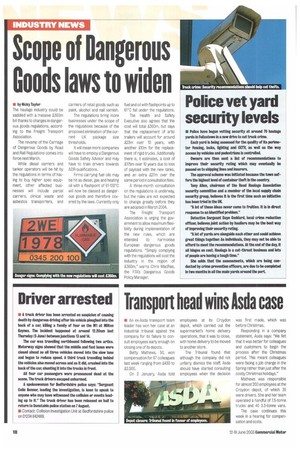Scope of Dangerous Goods laws to widen
Page 10

If you've noticed an error in this article please click here to report it so we can fix it.
• by Micky Taylor The haulage industry could be saddled with a massive £360m bill thanks to changes in dangerous goods regulations, according to the Freight Transport Association.
The revamp of the Carriage of Dangerous Goods by Road and Rail Regulations comes into force next March.
While diesel carriers and tanker operators will be hit by the regulations in terms of having to buy higher spec equipment, other affected businesses will include parcel carriers, clinical waste and asbestos transporters, and carriers of retail goods such as paint, alcohol and nail varnish.
The regulations bring more businesses under the scope of the regulations because of the proposed elimination of the cur rent UK package size thresholds.
It will mean more companies will have to employ a Dangerous Goods Safety Advisor and may have to train drivers towards ADR qualifications.
Firms carrying fuel oils may be hit as diesel, gas and heating oil with a flashpoint of 61-100°C will now be classed as dangerous goods and therefore covered by the laws. Currently only fuel and oil with flashports up to 61°C fall under the regulations.
The Health and Safety Executive also agrees that the cost will total £360m, but says that the replacement of artic trailers will account for around £23m over 10 years, with another £10m for the replacement of rigid trucks. Additionally there is, it estimates, a cost of £175m over 10 years due to loss of payload with the new tanks, and an extra £27m over the same period in consultation fees.
A three-month consultation on the regulations is underway, but the rules are not expected to change greatly before they are adopted in March 2004.
The freight Transport Association is urging the government to allow maximum flexibility during implementation of the new rules, which are intended to harmonise European dangerous goods regulations. 'Simply complying with the regulations will cost the industry in the region of £360m," warns Chris MacRae, the FTA's Dangerous Goods Policy Manager.












































































































































































